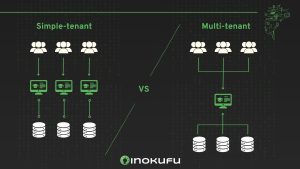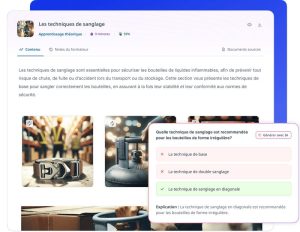Competency-Based Education (CBE) has gradually gained traction in both academic and professional training. This approach is more aligned with the evolving needs of the labor market.
The progressive adoption of CBE in education necessitates the use of tailored tools. In this context, Learning Management Systems (LMS) play a crucial role.
This article explains the advantages of using an LMS to implement competency-based education and explores its future potential.
The Benefits of Competency-Based Education
Competency-Based Education is a pedagogical approach focused on the acquisition and mastery of specific skills. Unlike traditional education, which often relies on standardized courses and exams aimed primarily at imparting theoretical knowledge, CBE emphasizes the development of practical and transferable skills.
This method is also:
- Self-directed and flexible: Learners progress at their own pace and validate skills as they demonstrate mastery.
- Individualized and outcome-oriented: Students focus their efforts on clearly defined skills and apply them in real-world scenarios.
- Knowledge-utilization driven: Students test their skills in various contexts and adapt their knowledge accordingly.
The goal is to prepare learners to meet the practical demands of their future careers or personal lives.
To learn more, check out our article on the topic 👉 Competency-Based Education
This approach requires tools for assessment, measurement, personalized resources, and knowledge sharing—making LMS indispensable.
LMS: Empowering Competency-Based Education
If you’re planning to implement Competency-Based Education, LMS can be a game-changer. They align seamlessly with the method’s requirements through various features:
Personalized Monitoring and Skills Assessment
An LMS provides precise, detailed tracking of student progress in each skill through dashboards and automatically generated reports.
Flexible Learning
LMS platforms support synchronous and asynchronous learning, allowing learners to proceed at their own pace and in a non-linear fashion. This flexibility aligns perfectly with CBE principles, enabling each student to advance based on their unique needs and actual mastery.
Real-Time Feedback
Immediate feedback is critical for effective learning. An LMS delivers instant evaluations after assessments, helping learners immediately understand their mistakes or identify areas for further improvement. This fosters motivation and guides students in their learning journey.
Tailored Resources and Personalized Learning
LMS platforms can host a variety of learning resources (videos, articles, tutorials, hands-on exercises) tailored to individual learner needs. Educators can also create personalized learning paths, providing additional resources or practical activities based on skills currently being acquired.
Collaboration and Experience Sharing
A key aspect of CBE is the exchange of experiences and skills. Modern LMS platforms include forums, discussion spaces, and collaboration tools where students can share best practices, engage in discussions, and collaborate on projects—creating an environment conducive to collaborative learning.
Future Prospects and LMS Potential for Competency-Based Education
As education continues to digitalize and the competency-based approach becomes more popular, the potential of LMS is evolving rapidly, especially with the integration of AI. Here are some examples of future advancements:
Artificial Intelligence and Adaptive Learning
The integration of AI into LMS could go beyond basic personalization by enabling adaptive learning. By analyzing learning data, LMS platforms could suggest optimized learning paths and specific activities tailored to each student’s profile. This would revolutionize competency-based learning by ensuring that every learner receives precisely the support they need.
This is what we are working on at Inokufu. To learn more : https://www.inokufu.com/ai-data/
Continuous Assessment through Simulation and VR
Virtual reality (VR) and advanced simulations could allow learners to practice in environments that closely mirror real-world conditions. These tools enable students to replicate workplace scenarios, applying their skills in practice. LMS platforms could further integrate these technologies to assess complex competencies in near-real conditions.
Blockchain and Secure Skill Validation
Blockchain technology could play a pivotal role in validating acquired competencies. How? By enabling secure and immutable certification of skills. LMS platforms could allow learners to demonstrate their skills to potential employers or academic institutions with greater freedom. This would provide reliable, instant recognition of validated skills.
This aspect of skill-sharing and certification is being explored at the European level through the Data Space Education & Skills initiative, in which Inokufu is a participant. Learn more about this innovative project 👉 https://prometheus-x.org/
Predictive Analytics and Guidance
With predictive analytics, future LMS platforms could anticipate students’ learning needs by identifying trends in their progress and suggesting modules to reinforce certain skills. This would provide teachers with proactive support tools to guide each student toward an optimal progression path.
Competency-Based Education, supported by LMS, represents a significant leap forward in the field of learning. With the integration of emerging technologies like AI, VR, and blockchain, the potential of LMS to support competency-based education continues to grow. In the future, these tools will fundamentally reshape how skills are acquired, assessed, and validated—paving the way for a more inclusive and learner-centered educational model.



